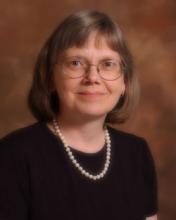 81MD, 85R-Neurology, 87F-Ophthalmology
81MD, 85R-Neurology, 87F-Ophthalmology
What is your hometown?
Minneapolis, Minnesota
What is your official title?
Professor of Neurology, Ophthalmology
Adjunct Professor of Obstetrics and Gynecology
Director, Center of Excellence Women’s Health
Director, Headache Clinic
University of Utah
What interested you to pursue a career in medicine and medical education?
I started out as an English-German major in undergraduate school. However, I was not entirely satisfied in that career path, and a number of events occurred in my life that lead me to medicine.
First, I read the essay "Two Cultures" by C.P. Snow which talked about improving our society by encouraging people from the arts to go into the sciences and vice versa. Second, my best friend in college became a quadriplegic and I began studying everything I could about the nervous system and spinal cord regeneration. Third my uncle, a physician who had also been an English major, encouraged me to try the sciences. I also married a physician and saw first hand the opportunities to serve people.
Please highlight your major career achievements, awards, discoveries, etc.
Clinically, I developed and directed a division of neuro-ophthalmology for 20 years. I also founded and directed the Headache Clinic at the University of Utah.
I am director of the University of Utah’s Center of Excellence in Women’s Health formerly funded by the Office on Women’s Health (OWH), Department of Health and Human Services. I am also the chair of the steering committee for an OWH funded project, Utah Women’s Health Information Network (UWIN) and direct a project on screening for diabetic retinopathy using telemedicine.
Working with the North American Neuro-ophthalmology Society and the University of Utah Eccles Health Sciences Library, I have developed the Neuro-ophthalmology Virtual Educational Library (NOVEL- http://library.med.utah.edu/NOVEL), an on-line repository of digital materials in neuro-ophthalmology for teaching and education.
Is there a teacher, mentor or Carver College of Medicine faculty member who has helped shape your education?
Arthur Benton, Ph.D., hired me to work in his lab during my “pre-med” education. He believed that I would make a good physician and encouraged me to apply to medical school. Dr. Harold Adams (74R-Neurology) was inspirational and got me interested in neurology. Dr. James Corbett really got me interested in neuro-ophthalmology. Dr. H. Stanley Thompson (66MS-Ophthalmology & Visual Sciences) encouraged me to ask questions and find answers. Also Dr. Hanna Damasio was a great influence.
How or why did you choose the University of Iowa for your education and medical training?
University of Iowa is known for its excellence in medical education. My husband was a resident in Obstetrics and Gynecology when I began medical school. I knew I would get the best medical school education at the University of Iowa.
What kind of professional opportunities or advantages has your University of Iowa medical training provided?
Being an Iowa graduate has been a great stepping stone. First, because of the reputation of the school I was invited to apply for several faculty positions after residency and fellowship. I quickly learned that my education was equal, and in some ways superior, to many individuals in the medical field. When anyone hears that I trained at Iowa, they recognize a quality medical education.
Please describe your professional interests.
My interests are to further the development of the NOVEL library, to remain active in national organizations and in the development of a center for women’s health.
What are some of your outside interests?
Hiking, traveling and reading.
Do you have an insight or philosophy that guides you in your professional work?
Several key principles have guided me. As Rose Kennedy told her children, “to whom much is given, much is expected”; and I believe service to our fellow human beings is the highest service anyone can give.
If you could change one thing about the practice or business of medicine, what would it be?
Access for all in our country to medical care. Medicine should not be a business model - it is a service to human kind.
What is the biggest change you've experienced in medicine since you were a student?
The use of the internet and the digital world in medicine. When I was in undergraduate and in medical school, we barely had calculators! I used a slide-rule in pre-med education! Being able to find results of tests for patients immediately, being able to collaborate across the world instantaneously on a research project or a paper — all makes the world smaller and more immediate.
The fact that medical knowledge is doubling every few months is staggering. This requires us all to be learning daily.
What one piece of advice would you give to today's medical students?
Find an area of medicine that makes your heart sing, that makes you excited for the next day, that makes you want to read and study every day because it is interesting and important.
What do you see as "the future" of the medicine?
I see medicine changing. I think we will see more of complementary medicine meeting traditional medicine for some important balance to promote preventative medicine. We will see individualized medicine where our genetic imprint will guide some of our decisions. I see a major shortage of physicians coming for the aging of our population. We will need to educate and train more mid-levels to help us all provide better care.